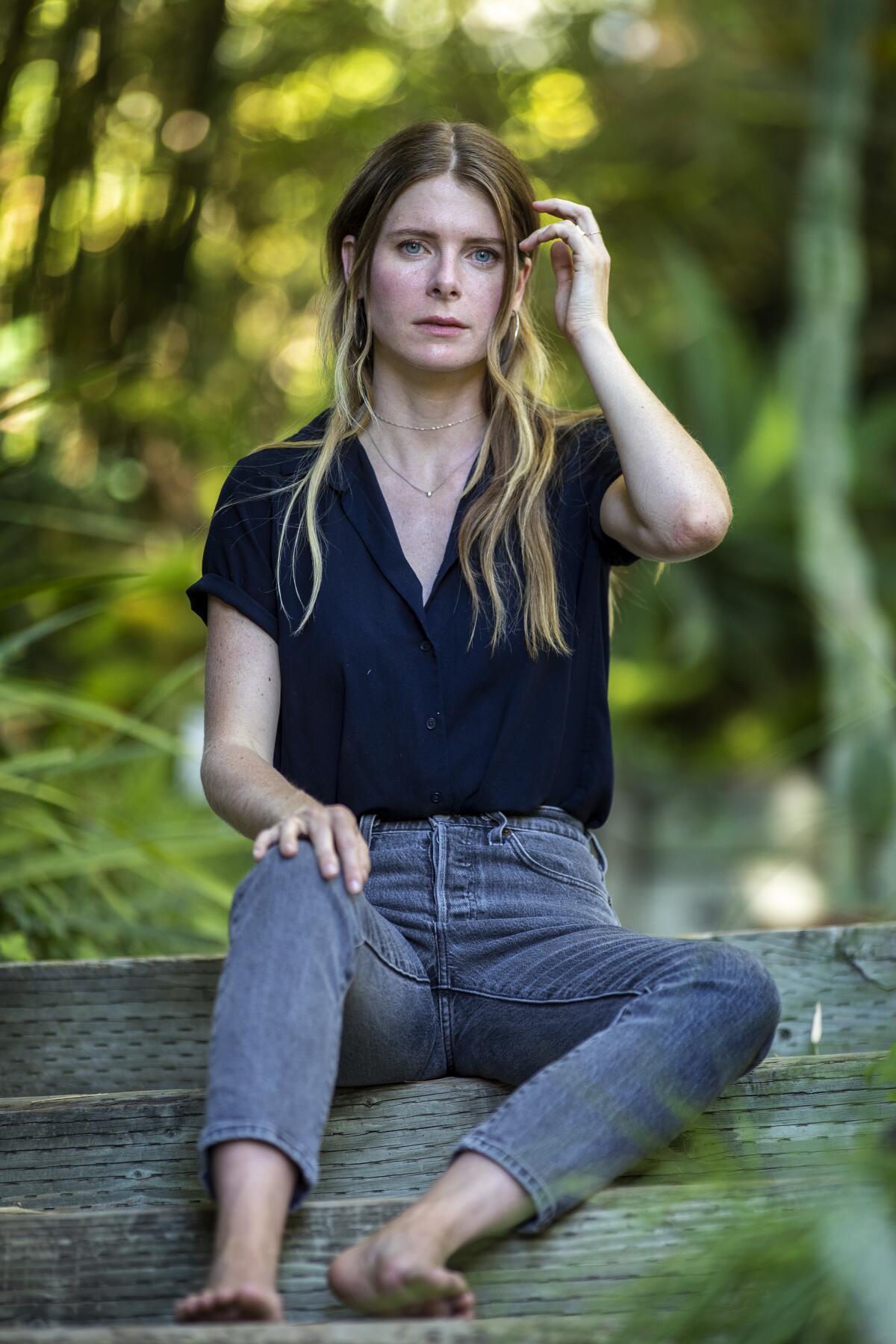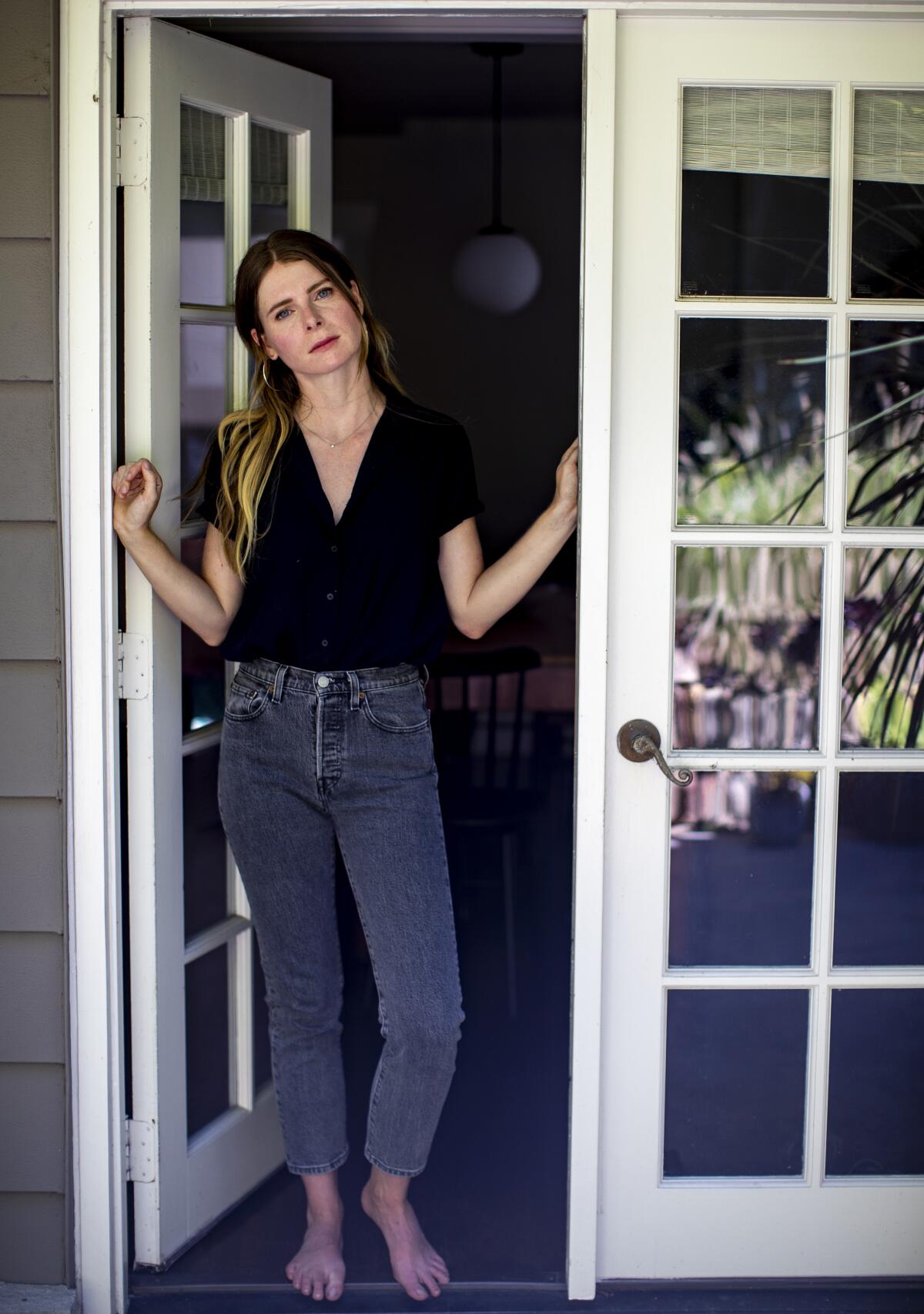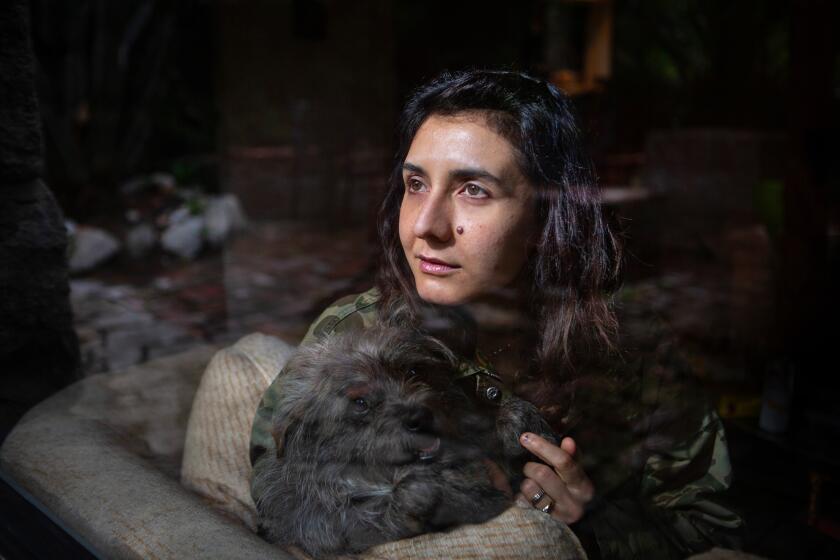Emma Cline was a literary darling, then a target. With ‘Daddy,’ she takes aim

- Share via
If you buy books linked on our site, The Times may earn a commission from Bookshop.org, whose fees support independent bookstores.
Emma Cline has just finished speaking with me off the record when she ducks her head, offers a sheepish smile, and says, “I just learned about it.” As in, after six years of publicity in the wake of her $2-million, three-book deal at the unheard-of age of 25, somebody had just now, between our first and second conversations, told Cline that she could speak off the record with a journalist.
During our first talk, Cline had seemed uncomfortable on-screen, blushing and chuckling nervously in her un-air-conditioned Silver Lake bedroom. Luckily, Zoom kept freezing up, and after 25 minutes we ditched it for the phone. She settled comfortably into invisibility and began talking about her new short story collection, “Daddy” — whose title, Cline knows, may make you a smidgen uncomfortable. “I was talking to a friend and, I think as a joke, he said ‘Why don’t you call it ‘Daddy?’” she says with a laugh. “I like the vulgarity, but also the innocent version of the word — that it has all these double meanings.” You can almost hear the wink.
The 2016 publication of “The Girls,” the narrative of an average 14-year-old girl who toys with joining a cult in 1969, occasioned the barrage of breathless profiles we reserve for young phenoms: a chatty British Vogue profile, a James Wood review in the New Yorker, a T Magazine tour of the crystal-strewn, paperback-piled, unheated Brooklyn backyard shed in which she wrote most of the novel. There were moody photographs of Cline, clad mostly in plain tees but occasionally a fashion-house-supplied gown.
The coverage started even before publication — her reputation literally preceded her. Then it galloped out of control when an ex-boyfriend, also a writer, brought a plagiarism lawsuit against her and, as she said at the time, “weaponized … [her] sexual history.” The press latched on, and her newfound literary celebrity was suddenly tainted. It’s no wonder she doesn’t love beaming reporters into her bedroom, that she’s delighted to learn she can exert some agency in our conversation. There’s already a mythologized version of her, frothed up by journalists eager to vivisect a prodigy, turn her into a Thing.
Celebrated for her novels, occasionally vilified for a persona she can’t control, the author of “Death in Her Hands” is our prophet of loneliness.
At 25 Cline felt “unformed,” the product of what she calls a “very unworldly” upbringing. But the roots of her writing obsessions lie there. The second of seven kids, including four younger sisters, Cline was intrigued by “group dynamics ... the way allegiances are always shifting.” Raised on her family’s winery in Sonoma County, “I was privileged in a million ways,” she says. “But I didn’t feel engaged in any larger cultural conversation, or didn’t have that ease and fluency. I didn’t know what success would look like or how to get it.” Her high school boyfriend’s parents, both “spiritually generous” artists, educated her in the small wonders of San Francisco coffee shops and bookstores.
In the course of an independent study, a high school English teacher asked her to send off some of his stories to literary magazines. “He tossed me a bone,” she says dryly; he told her she could send one of her own too. Tin House accepted it, and when they sent her the contract she asked if her parents also needed to sign. As she remembers, the magazine thought she was joking.
It was only a few years later that she was about as famous as a debut author could be. When journalists came calling, “it was peculiar to have to communicate your selfhood when you’re a little bit like, ‘I’m an amorphous blob,’” she says. It’s an idea she comes back to a few times — that she’s always aware of how her self is forming, or dissolving, alongside her work.

“The Girls” is a sidewise look at the Manson family in the summer of 1969, shearing off names and scrambling other details. With that bit of distance, Cline retrofitted the story, focusing on Evie as she clings to the other teenage members of the family, especially a drifter who lures her into their dusty, trash-strewn ranch but also protects her from committing too completely. From its title on, “The Girls” presents an extreme example of a common conundrum: Why are young women too often subject to — and sometimes complicit in — acts to which they don’t fully consent, or romance narratives they don’t create?
“It’s the easiest script for women to have,” Cline says. “Even if it didn’t quite fit.” As Evie thinks to herself, “All that time I had spent readying myself, the articles that taught me life was really just a waiting room until someone noticed you — the boys had spent that time becoming themselves.”
The stories in “Daddy,” the second piece of that massive three-book deal, were assembled over time, many published in prestigious magazines, but its preoccupations are so consistent that it could have been written in one straight caffeinated shot. Unlike “The Girls,” with its narrow viewpoint, “Daddy” approaches questions about power and connivance from a flurry of different angles.
Story by story, Laura van den Berg’s “I Hold a Wolf by the Ears” creates its own weather system, a place you’ll want to live in all summer.
Several stories hover over dried up older men — a once-powerful film director discarded by the industry, a father whose grown children shrug off his too-late love — or predators now languishing in cancellation limbo. The kind of men who call suicide hotlines after a fall from grace just to tell their ex-fiancées about it. Bad daddies, lame daddies, out-of-touch daddies.
Other, more vigorous pieces chronicle young girls performing their sexuality when they don’t really feel it. In “Los Angeles,” Alice works the floor at an American Apparel-like store where she is daily reminded to put her prettiness to work, to leverage the idea that she is what customers are really buying. The developing young women of “Marion,” just 11 and 13, pose each other’s nude bodies, red ribbons tied around their throats, like they’ve seen in Playboy. “You look young,” they cheer at one another as the Polaroids glide out of the camera, “really great.”
Every story leaves a sticky sheen, something alluring that you’re a little afraid to touch. It would be easy to read these as #MeToo parables laced with arsenic, but many were written well before 2017, and they are uninterested in regurgitating the now-obvious fact that powerful men do despicable things to women.
A studio art major in college, Cline still pops into figure drawing classes. “The difference between what you imagine a body looks like in your mind, the cartoonish sort of version of a body versus the reality of a body: That feels relevant to writing,” she says. Her stories are like those bodies — volcanic ingrown hairs and acne-scarred backs alongside perfectly arced cheekbones and oceanic eyes.
In the story “A/S/L,” 35-year-old Thora is at a “not quite rehab” facility in the Southwest. She’s been pretending to be “18 isshh” in online chats, posing with her hand thrown across her nipples, logging on as DaddyXO. When G., a TV chef accused of lewd harassment, turns up at the facility, Thora adds him to her to-do list. He cries frequently and keeps to himself, doing the work. She proceeds to systematically dismantle his recovery.
“My Dark Vanessa” is the latest and most unsettlingly effective book in a timely genre.
“I try to write them as full characters,” Cline says, “not because I want to redeem them or because I believe their version of themselves or I think they were badly mistreated. I write them like that because I want to write characters that occupy their full humanity.”
She tells me about reading Gitta Sereny’s “Into That Darkness,” a book based on 70 hours of interviews with Franz Stangl, commandant of Treblinka. “It’s one of the most insane, intense, humane books … and it works, because [Sereny] is — I guess ‘respectful’ might be the word, as weird as it sounds,” says Cline. “He’s obviously beyond a monster, but the way he conceptualizes himself and the story he tells himself about his life …” she trails off.
As a novelist she was inspired; as a human being, she was repulsed. “I think fiction benefits from ambiguity …” she says, “whereas obviously life doesn’t.”
So yes: In December 2017, Cline’s ex-boyfriend sued her, alleging she’d spied on him and plagiarized his work. The case, which you can read about in many of the same outlets that also breathlessly hyped her work, mushroomed into a volley of accusations. Nude, though blacked-out, images of Cline appeared in the suit, and she hired revenge-porn attorney Carrie Goldberg to represent her. The schadenfreude over her book deal found a target-rich environment in a suit meant to sow doubts about her talent.
Cline spent a few minutes talking about it with me. The plagiarism suit has been dropped. A judge ruled it had no merit. It’s an asterisk Cline doesn’t need beside her name every time her work is written about. When the subject came up a few hours into our conversations she whispered, “I knew this was coming.”
Though the lawsuit was a boondoggle for everyone but the blue-chip lawyers, the fallout was nearly career-ending. Her ex used it as a platform to destabilize Cline’s life, threatening to “expose” private behaviors, like porn habits, that seem scandalous only when women engage in them. In a statement at the time, she said, “I’ll never be able to get back the years I’ve now spent responding to an ex-boyfriend’s baseless legal assaults … instead of writing another book. That’s a loss I don’t know how to fully comprehend.”
The public melee unhoused Cline from the one place she’d felt secure: her work. “I trust fiction as the place where I could be vulnerable,” she says — in part because it “isn’t exposing my secret self or how I think about the world … it’s dredged from some … unconscious sludge.” By besmirching both her character and her work, the lawsuit stripped away all of her armor at once.
Former U.S. Poet Laureate Natasha Trethewey always wrote of public pain and private struggle. Her memoir, “Memorial Drive,” lets her mother speak.
The second time Cline and I talk, on FaceTime, she is in a more comfortable place — physically (a friend’s air-conditioned bedroom) and emotionally (she just received a finished copy of “Daddy”). “I was holding the book and kind of looking through it, and feeling very proud,” she says with a self-deprecating shrug, before pushing up a tiny smile. “I think there was a moment where I was so hurt and so bowled over that I didn’t think that I would work again, because it requires so much tenderness and openness. It’s like you don’t have skin.”
Rereading “The Girls,” what is striking is Evie’s failure to forgive herself. She narrates her youthful brush with infamy from the vantage of middle age. As a teenager Evie saw how she was, “first and foremost, a thing to be judged.” Now, with grayed hair and folds in her skin, not much has changed. She’d left the cult long before the stabbing spree, and yet she’s damned to the Sisyphean task of reminding everyone she meets that this one outsize moment from her youth isn’t the entirety of who she is.
Cline doesn’t have a frilly persona that she slides on and then does a little dance in. She wants to be, she says with a little self-mockery, like the character in a story by Barry Hannah whose title she can’t remember (it was “Love Too Long”). “She’s just done acid at a faculty party … She’s talking about how it’s her dream to just be a pair of eyes floating, like a little cloud with eyes. I think that’s often how I experience myself. In the best moments you’re just this observing consciousness, and it’s disconcerting for that reason to have anyone talk about you as if you’re a fixed self in the world.”
Cline has been asked by magazine editors to write profiles, sometimes of people she’s keenly interested in. But she can’t bring herself to do it. “I’m not sure I feel that I would be getting close to the truth of who they are as a person.” It’s easier in some ways to find the truth of a character through fiction. It’s also easier to avoid being judged as anything more than a set of eyes.
The story “White Noise,” published this summer in the New Yorker but not included in “Daddy,” brings Cline’s work to a sharper point; it’s like a prison shiv carved out of a toothbrush. In “The Girls” Manson is given a new name, and the celebrity predator in “A/S/L,” “the moral center of the story,” has only an initial. But “White Noise” — a fictional profile of a real celebrity — follows a day in the life of a post-downfall, pre-trial Harvey Weinstein. He bumbles around a Connecticut estate and reminds himself of his power, his innocence, his goddamn expensive team of lawyers. “He believed, truly, that he would be exonerated. How could he not be? This was America.” Weinstein’s lawyer, David Boies, also represented Cline’s ex-boyfriend in his lawsuit.
Cline’s Harvey recalls the pain he put women through, how “he enjoyed it all … it was like different flavors of ice cream.” But he’s pitiful, fumbling, washed up. A hit of ketamine loosens him up into idiocy. He mistakes an elderly neighbor for the literary lion Don DeLillo and fantasizes that a film adaptation of his novel “White Noise” will revive his career. It’s a humiliating portrait, more damning for its nuance.
“I tend to avoid writing real people for whatever reason,” Cline says. “But it wouldn’t have worked if it was a vague version of Harvey Weinstein. Something about his specificity was important.” Painting a sexual predator of any ilk would have drawn comparisons to Weinstein anyway. This way, Cline hit a series of targets at once: a new emotional window onto the banality of evil; an homage to a literary hero; and a squarely landed blow across the bogeyman’s glass jaw. She comes for the king and she doesn’t miss.
One aspect of that Barry Hannah story that Cline didn’t remember is that the woman at the party doesn’t just want to be eyes — she wants a mouth and ears too. The little cloud doesn’t just watch. It listens. And it talks back.
Over the last three months, 17 writers provided diaries to the Times of their days in isolation, followed by weeks of protest. This is their story.
More to Read
Sign up for our Book Club newsletter
Get the latest news, events and more from the Los Angeles Times Book Club, and help us get L.A. reading and talking.
You may occasionally receive promotional content from the Los Angeles Times.










